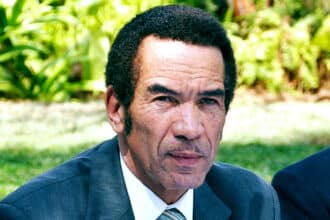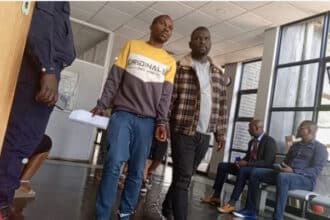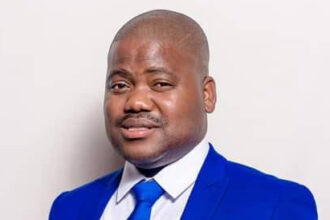An eye for debate
Always current, often explosive and rarely dull, ‘The Eye’ is one of Btv’s most popular and engaging programmes, keeping the people glued to their screens every Tuesday evening.
For the last 14 years, the current affairs show has been hosted by the charismatic Omphile Sehurutshe, a hard-hitting presenter unafraid to ask the difficult questions.
The Nata native’s probing interrogations often leave even the boldest of politicians squirming in their seats.
Despite his obvious taste for television, Sehurutshe earns his daily bread through figures. He is in fact an Economics graduate and works as the Head of Projects at one of Botswana’s biggest banks.
The Voice’s PORTIA MLILO caught up with the talented presenter, regarded by many as the heartbeat of The Eye.
Q. How did you end up becoming a TV presenter?
It started when I was 19-years-old, having just completed my Form 5 when Botswana Television was still new.
I used to watch the programme and told my cousins that one day I am going to present it.
It was a joke back then.
We all had a great laugh but inside I kept my faith and kept my eyes on the goal.
Q. But what was your inspiration?
I did debate at school and I was passionate about it.
So when I got to learn about the programme, I was naturally drawn towards it.
Q. What issues does The Eye predominantly cover?
The Eye is a current affairs programme that aims at bringing subject matter experts and leaders together to discuss socio-economic issues with particular focus on how they impact Batswana, SADC, and Africans.
It allows free and honest debate and dialogue on how the issues affecting them can best be dealt with.
The programme seeks to act as a voice of the viewer, that is why everything about it is designed from the citizens’ perspective.
I consider us privileged to live in a country where leaders are willing to come to the party and speak about the work they do for the electorate.
I am overwhelmed and truly humbled by the enthusiasm of our leaders and their willingness to have accountability conversations.
Q. What influences your choice of topic for discussion?
My production team and I always make sure that the topics matter to Batswana and have relevance and purpose.
It could be to address a need in the country or to equip Batswana with relevant and important information.
Essentially it must speak to the life of a Motswana, the challenges faced by citizens or their aspirations.
Q. What challenges do you face when trying to persuade guests to appear on your show?
Generally, we get a good reception when asking guests to come through provided their dates are accommodating.
The challenge we often face is when our guests feel that for a particular topic, the timing on their side is not convenient for various reasons.
For example, when they have not yet taken a position or are still reviewing their position as an organisation on a particular topic.
Overall, my producers do a sterling job identifying and getting speakers for the programme.
Q. Take our readers through your preparations for the show?
After we have identified a topic, the first and most important questions that my producers and I give attention to are: what would the viewer want to get out of this project?
What are the key or pertinent issues surrounding the topic?
I then read extensively and widely to augment my knowledge of the topic.
Finally, I take my time to prepare questions and to give them a perspective that is useful to the viewer.
In some cases, depending on the complexity of the topic, I do rehearse these questions to sense their ‘flavor’.
Before I go into the studio, I prep my guests and let them know what we are going to discuss and the type of questions they should expect to tackle.
Then I give them a moment to tally their notes.
Q. As a presenter, what exactly does your role entail?
My role is to create a platform where my guests feel free to air their views and more importantly free to debate.
I also have to keep the debate interesting, give it life and keep it focused so that we don’t derail.
It’s also important that I follow through and probe to get to the core of the matter and not just gloss over it.
Q. You have been on TV for roughly 14 years, what do you enjoy most about being a presenter?
First of all, for me it’s a passion not so much a job; so I connect with the programme naturally and effortlessly.
What I enjoy most is creating a platform for people to talk and openly debate the important issues – this is profoundly important to me personally!
Q. Of the topics you have covered, which one was the most satisfying for you?
Eish, I have done too many programmes, some very enlightening, some emotive, and some very challenging.
In the early years I would keep a tally but now I don’t do that a lot, it has been a long journey!
However, I remember my first programme very well.
I was extremely nervous. We were having a discussion with a representative of the Islamic community in Botswana about their views on how their religion is sometimes around the world associated with violence.
I am also grateful for the interviews I have had with our former Vice President, Ponatshego Kedikilwe, and our former President, Festus Mogae.
Q. Members of the public often ask about the difference between The Eye and Matlho a Phage. Kindly help differentiate the two programmes.
The Eye is a brand that focuses on socio-economic issues whereas Matlho a Phage is a programme that discusses political issues.
Q. What impact do you think your programme has in people’s lives and the development of the country?
The Eye has cemented our beliefs as a society that true to our culture, mafoko a kgotla a mantle otlhe.
It has demonstrated the commitment of our leaders to open and honest dialogue and debate.
The Eye has further demonstrated the commitment of our leaders to account for its electorates and that is an important quality of servant leadership and for that ke ba rolela hutshe (I salute them).
Servant leadership though very fulfilling to a true leader, is by far the hardest type of leadership.
I also believe that The Eye has enlightened, educated, and empowered our people, opened their eyes, and promoted healthy and informed dialogue.
Because of this brand, as Batswana, we now know that we are empowered to dialogue and freely debate the issues that matter to us.
Q. What do you regard as your greatest achievements as a TV presenter?
Apart from the MISA Award that I received, my greatest achievement is being the person that for years has inspired open dialogue and deep reflection about issues that matter in our society, that we can differ, sometimes very deeply and still do so respecting one another and respecting the sanctity of our oneness as Batswana.
I am forever proud and grateful for this privilege and deeply humbled and I hope someday I can pass on my skills to another young Motswana as it was passed onto me by my colleagues Alpheons (the late) and Jennifer.
I have interviewed and interacted with experts, industry captains, heads of governments, diplomats, and learned a lot from them and that has helped to understand my country better and the sheer potential that this country truly has.
It is scary, the untapped potential that Botswana and Batswana hold to this day!
Q. On the flip side, what was your worst experience on TV?
Mmmm… my trainer and dear brother the late Alpheons Moroke was very, very brutal with feedback.
In the early days after the programme he would give very brutal feedback.
Years later I smiled about it as I know that he was sharpening me and I am thankful.
Q. So, what makes a great TV presenter?
An inquisitive mind is a great asset in this job. Style – define your style and execute it boldly.
Your style is as much a part of the programme as is the topic itself.
The greatest presenters, radio or television, all have a particular style that characterizes them and they stay true to it and hone it over time.
One has to take interest, read, listen and stay alive to what is happening around their environment.
Respect your job, your colleagues, especially your producers and your guests.
On that note I would like to say a big thank you to my producers, present and past.
I have always had great people next to me and that has contributed immensely to the successes we have accomplished to date.
A big thanks to all my crew, present and past, they are the ‘magicians’ behind the scene.
Q. What advice can you give to young people aspiring to be TV presenters?
The lessons I have shared under ‘What makes a great TV Presenter’ are a good start.
In addition, though, I must say: do it for the right reasons because that way you will grow and your work will give you fulfillment and contentment.
Finally, remain honestly impartial and free yourself from taking sides, even partisan sides.
And above all remain forever humble.
The job we do is on behalf of the people and we are never greater than them!
Q. Who is your inspiration?
God is my first, greatest and everlasting inspiration.
My wife is my number one fan and cheerleader and my children are my inspiration as are all my parents and extended family because they are always supportive.
I also get a lot of inspiration from serving the beautiful people of this country – it gives me great joy!
Q. And finally, Thank God It’s Friday, what are your plans for the weekend?
Oooh! I am going to be chilling with family at home and calling the distant ones.
I will also be checking on fellow church mates.





